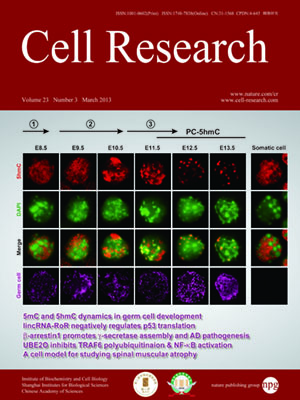
Volume 23, No 3, Mar 2013
ISSN: 1001-0602
EISSN: 1748-7838 2018
impact factor 17.848*
(Clarivate Analytics, 2019)
Volume 23 Issue 3, March 2013: 351-365
ORIGINAL ARTICLES
β-Arrestin1 regulates γ-secretase complex assembly and modulates amyloid-β pathology
Xiaosong Liu1,*, Xiaohui Zhao1,*, Xianglu Zeng1, Koen Bossers3, Dick F Swaab3,Jian Zhao1,2 and Gang Pei1,2,4
Correspondence: Gang Pei Jian Zhao(gpei@sibs.ac.cn; jzhao@sibs.ac.cn)
Alzheimer's disease (AD) is a progressive and complex neurodegenerative disease in which the γ-secretase-mediated amyloid-β (Aβ) pathology plays an important role. We found that a multifunctional protein, β-arrestin1, facilitated the formation of NCT/APH-1 (anterior pharynx-defective phenotype 1) precomplex and mature γ-secretase complex through its functional interaction with APH-1. Deficiency of β-arrestin1 or inhibition of binding of β-arrestin1 with APH-1 by small peptides reduced Aβ production without affecting Notch processing. Genetic ablation of β-arrestin1 diminished Aβ pathology and behavioral deficits in transgenic AD mice. Moreover, in brains of sporadic AD patients and transgenic AD mice, the expression of β-arrestin1 was upregulated and correlated well with neuropathological severity and senile Aβ plaques. Thus, our study identifies a regulatory mechanism underlying both γ-secretase assembly and AD pathogenesis, and indicates that specific reduction of Aβ pathology can be achieved by regulation of the γ-secretase assembly.
Cell Research (2013) 23:351–365; doi:10.1038/cr.2012.167; published online 4 December 2012
FULL TEXT | PDF
Browse 2086


